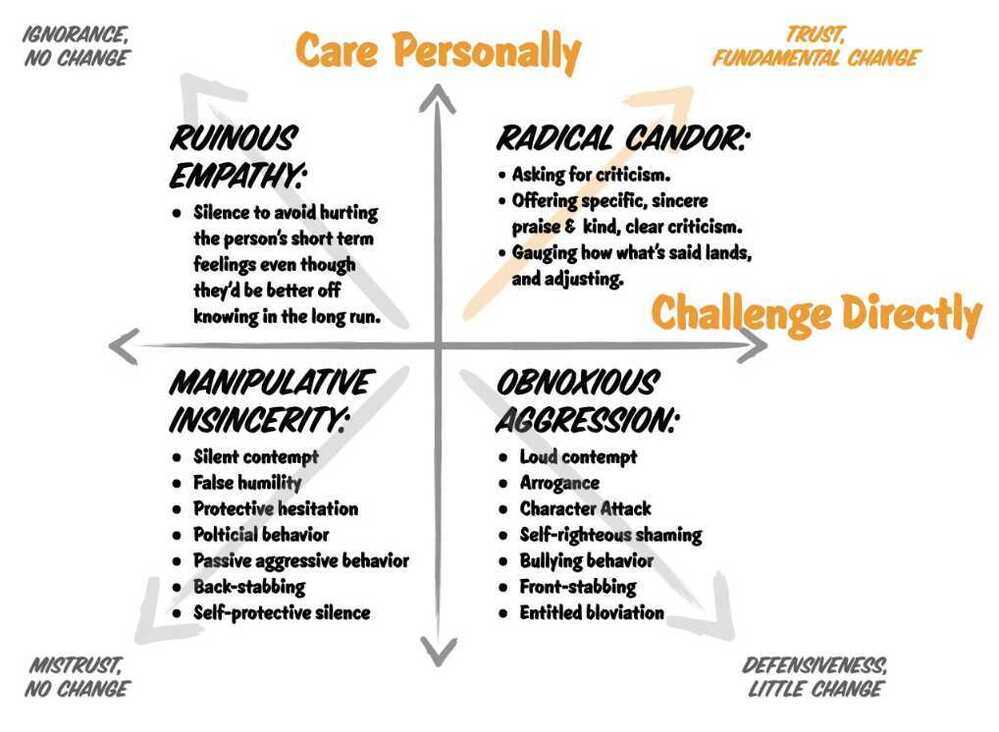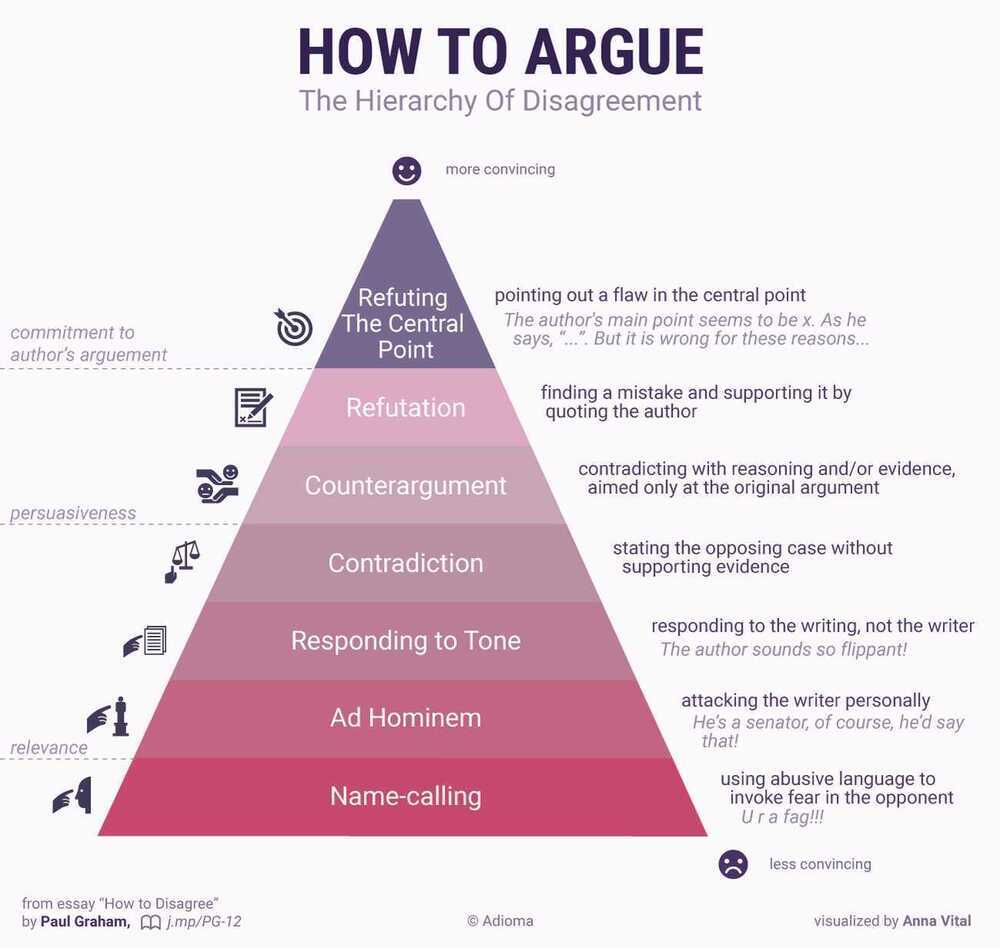Disagreement / Feedback
Giving Feedback

Why are we Yelling?: The Art of Productive Disagreement by Buster Benson
- 5:1 disagreements
- Productive arguments
- Backfire effect
- Arguments never ends
- Head True, heart meaningful, hand useful
- Project our own fears
- Anxiety
- Cognitive dissonance
5 Simple Steps to Disagree with Feedback
There may be times when you receive feedback that you don't necessarily agree with.
It's important to recognise that just because someone’s offering feedback doesn't necessarily mean that it's right or that you have to accept it without question.
Instead, it's important to use your own judgement and wisdom to determine what's best for you.
If you do find yourself in a situation where you disagree with feedback, don't be afraid to speak up. Remember, your goal should be to openly share your perspective in a respectful and assertive way (without being confrontational), and work towards a resolution.
It's also important to actively listen to the other person's perspective, even if you don't ultimately agree with it. Try to understand their point of view and look for common ground that you can build on.
Approaching a feedback situation with an open mind and willingness to collaborate can lead to unexpected positive outcomes - without the fear of damaging the relationship.
5 Steps to Disagree with Feedback
Step 1: Gracious Acknowledgment
Starting off on a positive note can help create a positive tone for the rest of the conversation, and helps prime your state. Express gratitude for the time and effort the person took to provide their feedback.
Example: "Thanks for taking the time to share your feedback on my presentation. I appreciate your willingness to share your thoughts."
Step 2: Pinpointing Perspectives
Before you go all-in and disagree with the feedback you received, take a moment to clarify things. Make sure you fully understand what the other person is saying by asking questions and getting more insight into their perspective. This helps you ensure that you're addressing the right issues and will allow you to come up with a better response.
Example: "Could you please clarify what you meant by 'lacking in substance'? I want to make sure I understand your perspective", and "Let me make sure I've understood you... [then you paraphrase what they've said]"
Step 3: Sharing Your Side
When it's time to share your disagreement, don't hold back - but do it in a way that's clear and to the point. Avoid becoming defensive or confrontational (e.g. exclaiming "you're wrong" won't get you very far), so take a deep breath and calm your state. Provide specific examples to support your perspective and explain why you feel differently. A great tip is to avoid saying the word "disagree" and present your perspective a different way, e.g. "I see things a different way..." or "From my perspective…".
Example: "I understand that you feel the presentation was lacking in substance. I see things a different way. I feel that the data and analysis I presented were both relevant and valuable. For example, the data showed a clear trend that supports our marketing strategy."
*(You can also ask for a timeout here - see 'NOTE' after Step 5)
Step 4: Collaborative Resolution
Instead of simply disagreeing and leaving it at that, try to find a solution or compromise that addresses both your perspective and the feedback you received. This shows that you're willing to work together to find a resolution.
Example: "I understand that you might have expected more detail in the presentation. For the next one, I’ll make sure I include more specific examples to support each point. I’d be happy to share an outline with you beforehand for review if that helps too. Would that better meet your expectations?"
Step 5: Grateful Conclusion
Wrap up the conversation on a positive note by thanking them again for their feedback and for the conversation.
Example: "Thanks again for your feedback and for taking the time to raise it. I appreciate the opportunity to improve."
*NOTE: If the feedback is unexpected or difficult to hear, you can ask for time to process and reflect before responding (this would come before Step 3). This gives you space to process your emotions and formulate a thoughtful response. Example: "Thanks for sharing your feedback - I really appreciate your openness. Before responding, I'd like to take some time to process and reflect on what you've shared. Could I take some time to think about this and got back to you in a few days with my thoughts?"
Unsolicited Advice?
How would you respond if someone gives you advice that you didn't ask for and you don't agree with? Here are four examples of respectful yet firm responses you could use:
- "Thank you, I'll consider if it works for me."
- "I appreciate your thoughts, but I already have a plan for how I'll improve."
- "That's an interesting perspective, but I prefer to do it my way. If I need help in the future, I'll reach out to you."
- "I appreciate your willingness to help, but I feel like I have a handle on the situation. If I do need help later on, I'll definitely contact you."
(Quick note: It's important to note that every situation is unique, so exercise your own judgment and wisdom when responding to unsolicited advice).
Remember, feedback is not a one-size-fits-all approach. Trust your own judgement and use feedback as a tool to enhance your growth and development.
How to Argue / Argument / Refute

What is your sample size?
How To Argue - The Hierarchy of Disagreement - Adioma
Hierarchy of disagreement - RationalWiki
Reductio ad absurdum
- Reductio ad absurdum - reduction to absurdity
- argumentum ad absurdum - argument to absurdity
- apagogical arguments
Is the form of argument that attempts to establish a claim by showing that the opposite scenario would lead to absurdity or contradiction.
A form of the reductio ad absurdum argument, known as indirect proof or reductio ad impossibile, is one that proves a proposition by showing that its denial conjoined with other propositions previously proved or accepted leads to a contradiction. In common speech the term reductio ad absurdum refers to anything pushed to absurd extremes.
Reductio ad absurdum - Wikipedia
Why You Believe The Things You Do
I remember reading an article years ago about a father in Yemen who lost a son to starvation, only to have another child fall dangerously ill. Desperate, he turned to tribal elders who recommended a folk remedy: Shove a burning stick through the sick child’s chest to drain the illness. The father agreed.
When you have no money, and your son is sick, you’ll believe anything.
Here’s a universal reality: What you believe to be true is influenced by how much you want it to be true. The more something helps you deal with uncertainty, the lower the bar is for you to believe it’s true.
If you turn on the television, you find the mothers of the most obvious criminals that man could ever diagnose, and they all think their sons are innocent. The reality is too painful to bear, so you just distort it until it’s bearable.
We have a belief-generating system: What you think is true is heavily based on what you’ve experienced, and you remember the parts of your experiences that make good stories, confirm stereotypes, and connect dots between other experiences.
It is far easier to fool yourself into believing a falsehood than admit a mistake. Changing your mind is rarer than it should be, leading us to cling to false beliefs.
You can agree with every word written there and still struggle to change your mind - or take seriously those who do - for two reasons.
- when you change your mind you can feel like all the hard-fought effort you put into establishing your previous beliefs was wasted. Even a little pain from that reality can be enough to persuade you to stick to the original belief.
- when you change your mind, moving from one belief to another, it can be hard to take the new belief seriously - changing beliefs offers proof that the new belief may be short-lived, especially in the eyes of others.
A lot of times we’re not interested in truth - we’re interested in the elimination of uncertainty, and that fact alone causes us to believe things that have little relation to reality.